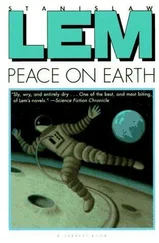Perhaps the so-called letter was a recording of several emissions at once. If one assumed that in the Galaxy automatic transmitters were operating on precisely that “frequency,” in that band, which we were treating as a single channel of communication, then even the constant repetition of the signals could be explained. They could be signals used by societies in some “civilizational collective” to keep in systematic synchronization certain technological devices of theirs, possibly astroengineering devices.
This would account for the “circularity” of the signals. But it fit poorly with Frog Eggs; although, stretching things a little, one could put its synthesis also into this scheme. In any case, the scheme was more modest and therefore more sensible than the giant visions that had been unfolded before us. There existed a mystery outside the signal, namely, the fact that it was alone. There should have been a great many of them. But to refashion the whole Universe to “explain” this mystery was a luxury we could ill afford. Why, the “signal” could be declared to be a “music of the spheres,” a kind of hymn, a neutrino fanfare with which the High Civilization would greet, say, the ascension of a supernova. The letter also could be apostolic: we had, here, a Word that became Flesh. And we had, in opposition to it, Frog Eggs, which as Lord of the Flies — the work, therefore, of darkness — indicated the Manichean nature of the signal, and of the world. To pursue any further this sort of exegesis should not be allowed. Basically, both ideas were conservative, and Lerner’s in particular, because it boiled down to a defense, a desperate defense, even, of the empirical position. Lerner did not want to leave the traditional points of view of the exact sciences, which from their inception had dealt with the phenomena of Nature and not of Culture, for there does not exist a physics or chemistry of Culture, but only of the “stuff of the Universe.” Not willing to give up treating the Universe as a purely physical object, devoid of “meanings,” Lerner acted like a man prepared to study a handwritten letter as if it were a seismogram. In the final analysis, handwriting, like a seismogram, was a lot of complicated curved lines.
Sylvester’s hypothesis I characterized as an attempt to answer the question “Do successive Universes inherit from one another?” He supplied an answer in which our “code,” though remaining an artifact, ceased to be a letter. I concluded by showing the incredible number of assumptions that both had pulled out of the air: the negative umbilicus of matter compressed into information at the bottom of the contraction — well; the branding of the wave front with the “atom-generating” stigmata — it would never be possible to verify any of this, ex definitione, because presumably these things would occur where there would no longer be beings of any kind, or physics. This was a discussion about life after death, decked up in the terminology of science. Or it was a sort of “philosophy fiction” — by analogy to science fiction. The mathematical robe concealed a mythology. In this I could see the signum temporis, but nothing more.
Naturally, the discussion then took off like wildfire. Toward the end of it, Rappaport suddenly rose with “one more hypothesis.” It was so original that I present it here. He defended the thesis that the difference between “artificial” and “natural” was not entirely objective, not an absolute given, but a relative thing and dependent on the cognitive frame of reference. Substances excreted by living organisms in the course of their metabolism we considered to be natural products. If I ate a great quantity of sugar, its excess would be eliminated by my kidneys. Whether the sugar in the urine was “artificial” or “natural” depended on my purpose. If I ate so much sugar intentionally, in order to eliminate it, knowing the mechanism involved and able to predict the effects of my action, the sugar would be “artificially” present; but if I ate it because I had a craving for it, and for no other reason, its presence would be “natural.” One could demonstrate this. If someone examined my urine and if I had arranged this with him accordingly, the presence of sugar which he would discover could acquire the meaning of an informational signal. The sugar might signify, for instance, “yes,” and the lack of sugar “no.” This process of symbolic signaling would be as artificial as could be, but only between the two of us. Whoever did not know of our arrangement would learn nothing of it from an examination of the urine. So, then, in Culture as well as in Nature only the “natural” phenomena existed “really and truly”; the “artificial” were artificial only insofar as we related them, by agreement or action, in a definite way. Only miracles were “absolutely artificial,” and they were impossible.
After this introduction Rappaport delivered the main blow. Let us suppose that biological evolution could take a double path: it could create separate organisms, and then, from them, intelligent beings; or it could create, on the other branch, biospheres that were “nonintelligent” but at the same time highly organized — and let us call these “forests of living flesh,” or vegetation of still another type, one that in the course of a very long development would master even nuclear energy. The vegetation’s evolution would master it, however, not in the way that we mastered bomb or reactor technology, but in the way that our bodies “mastered” metabolism. In this case the products of the metabolism would be phenomena of a radioactive type — and, at a later stage, even streams of neutrinos, which would be nothing but the “excretion” from such globes, of the organisms on them, excretion which we would receive precisely in the form of a “stellar code.” In this case we would have a completely natural process, because beings would not be intending to send anything to anyone, or to communicate, and the streams in question would be only the inevitable result of their metabolic activity, an “excretory emission.” But it could also be that other planetary organisms would learn of their presence by this “spoor” left in space. Then it would constitute a kind of signal between them.
Rappaport added that his hypothesis fit into the class of things native to science, because science did not divide phenomena into “artificial” and “natural,” and therefore he had entered into the spirit of its rules. The hypothesis, in principle at least, could be tested (by detecting the presence, or merely proving the theoretical possibility, of “neutrino organisms”), because it did not refer us to “other Universes.”
Not everyone grasped that this was more than just an exhibition of wit. It was possible, in principle, to predict and calculate any type of organic metabolism when one began with physics and chemistry, whereas it was not possible, beginning with the same physics and chemistry, to predict or calculate a culture in which certain beings would write and send “neutrino letters.” This second phenomenon was of another, nonphysical, order. If civilizations spoke to one another in different languages, and their differences in development were considerable, at best those who were less knowledgeable would extract from the received communication only (or nearly only) what was physical in it (or natural, the same thing). They would understand nothing more. And in fact, with a sufficiently large gap between civilizations, the same concept-symbols, even if they functioned in both cultures, would have totally different referents.
There was discussed, among other things, the question of whether or not the probable “civilization of the Senders,” either existing or (according to Sylvester) no longer among the living, was rational. And how could we say that a civilization that concerned itself about what would be “in the next Universe,” thirty billion years away, was rational? Even for a fantastically wealthy civilization, what had to be the cost, the price paid in the fates of living beings, for it to become the helmsman of the Great Cosmogony? This also, analogously, held for the “life-causing effect.” One might say that for them this was rational — or that there was no intercivilizationally constant sense of “rationality.” A dozen of us gathered at Baloyne’s after the closing of the meeting, and talked long into the night. If Sylvester and Lerner failed to convince us, they definitely poured oil on the troubled waters of the past. There was discussion about what Rappaport had presented. He added to it and made clarifications, and from this emerged a strange picture indeed — of leviathan biospheres that “sent” into the Universe, unaware of what they were doing; of an advanced stage of homeostasis, unknown to us; of amalgamations of vital processes which, drawing upon the sources of nuclear energy, began to equal, in their metabolic conversions, the power of suns. The biophilia of their “neutrino excretion” represented an effect exactly like that of the plants, whose activity had filled the atmosphere of Earth with oxygen, thus making life possible for other organisms, organisms that did not know of photosynthesis. And surely it was unintentional on the part of the grass to give us the opportunity to exist! Frog Eggs and the whole “informational” side of the letter became the products of an incredibly complex metabolism. Frog Eggs was a kind of waste, a cinder whose structure derived from planetary metabolisms.
Читать дальше












